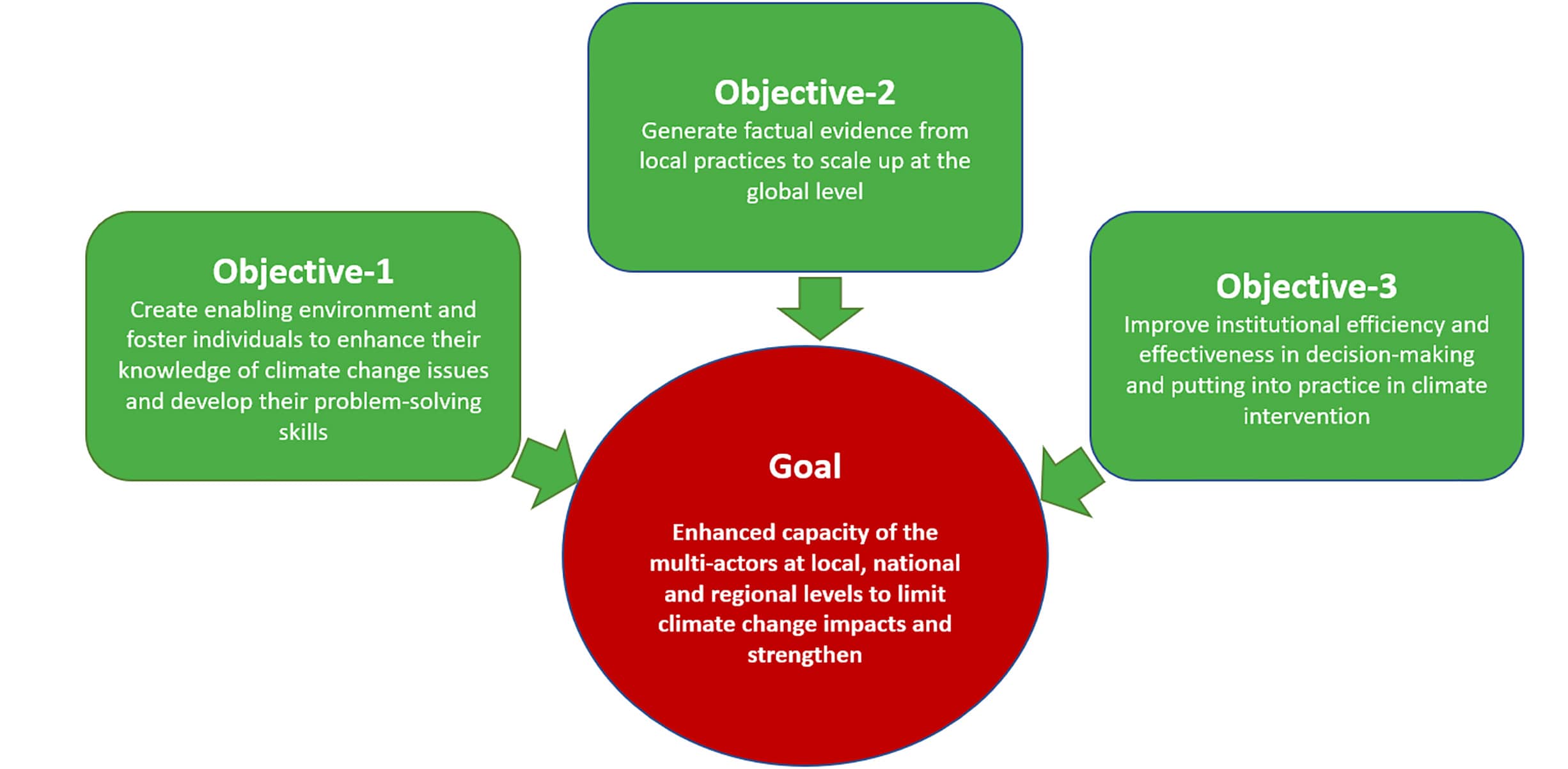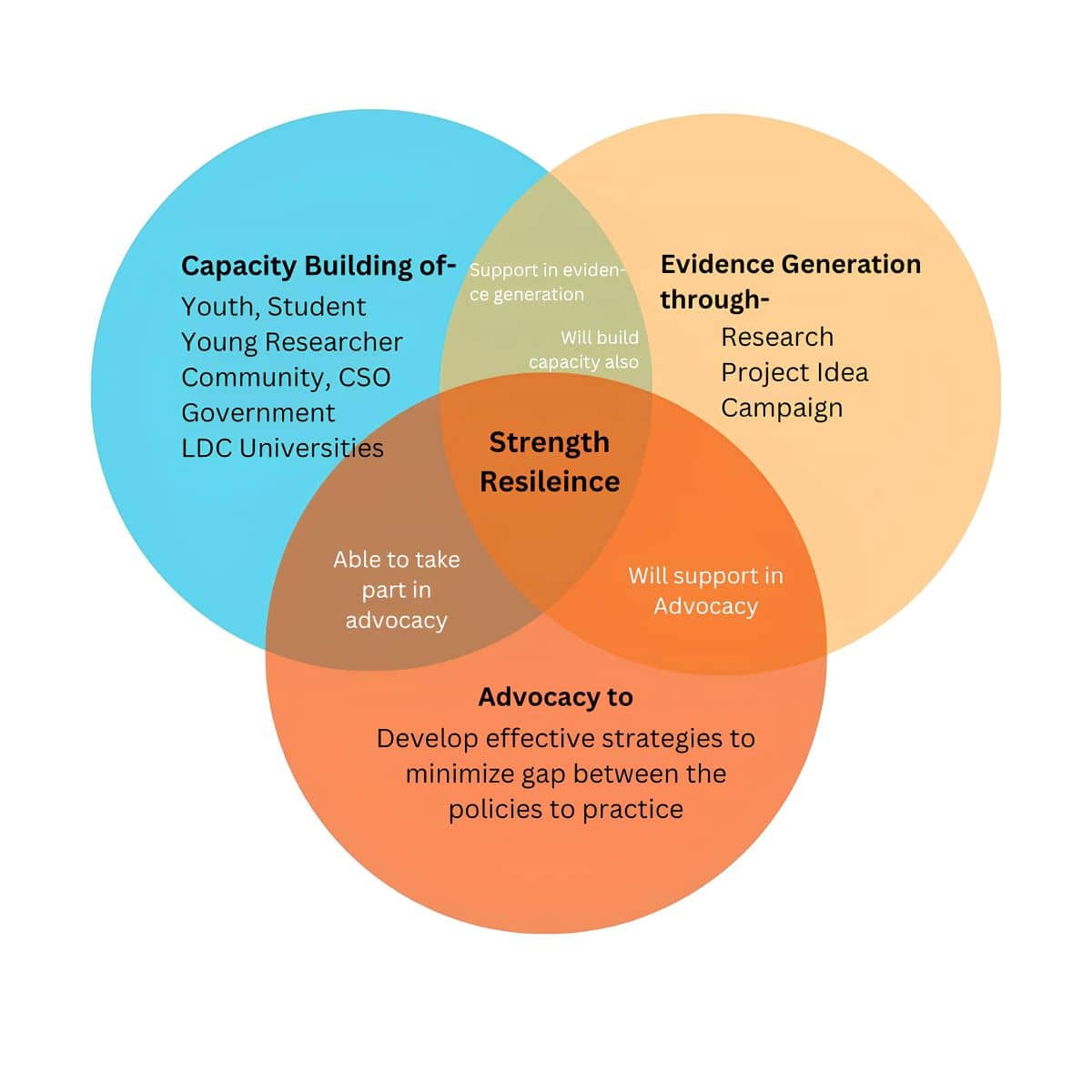PROJECT OVERVIEW
The International Center for Climate Change and Development (ICCCAD) in collaboration with the Independent University of Bangladesh (IUB) has currently implementing a project, “Capacity strengthening of multi-Actors to limit climate change impacts and Enhance resilience- (CAP-RES)” funded by Embassy of Sweden, Dhaka. Bangladesh faces high climate vulnerability, requiring urgent adaptation efforts outlined in national plans. Challenges include lack of capacity of government officials and CSOs, top-down decision approach, structural inequalities, lack of inter-ministerial coordination etc. The project aims to enhance institutional capacities at local, national, and regional levels emphasizing SDGs 4, 13, and 17, through focusing on education, climate action, and partnerships. Leveraging ICCCAD’s expertise the project aims to fill knowledge gaps, capacitate multi-actors, and promote locally-led climate action.
The project is set to unfold over a span of 48 months, commencing from January 1, 2023, to December 31, 2026. The project has been endowed with a total budget of 12 million SEK (Swedish Kronor), equivalent to 120 million BDT (Bangladeshi Taka). The gracious funding for this initiative is provided by the Embassy of Sweden. This strategic collaboration and financial support signify a significant partnership aimed at fostering positive developments and achieving the envisioned goals of the project.
The project CAP-RES is designed with three objectives that give the project a unique value in capacity building through skill development, evidence generation, and advocacy.

In line with these three objectives, the project planned its five major activity pillars to play a comprehensive role in strengthening resilience.

The nexus between objectives, activity, and strength resilience: Figure 3 illustrates the interconnected relationship between three key objectives. “Capacity building” is a central goal, directly advanced by activity pillars 3 and 4, both of which emphasize enhancing the capabilities of diverse individuals through training, workshops, policy dialogues, internships, and more.

“The generation of evidence” is another important objective, primarily addressed by activity pillars 1 and 2, which focus on providing funding for research, projects, and campaign ideas led by young researchers, university students, and clubs.
The final objective, “advocacy,” is accomplished by engaging policy-makers at local, national, and international levels through events associated with the Conference of the Parties (COP).
Notably, this framework acknowledges the synergy between these objectives. Capacitated individuals can actively contribute to evidence generation and policy advocacy, while evidence generation, whether through research or projects, can also enhance their capacities. Furthermore, the gathered evidence, comprising data and information, serves as a foundation for policy advocacy efforts aimed at bridging the gap between policy development and practical implementation.
All the outcomes and efforts of these activities play a crucial role in fortifying Bangladesh’s resilience in combating the challenges posed by climate change.
Below all the activities are explained for detailed understanding-
Research Grant and Fellowship: This is the first pillar of the project, aimed at generating ground evidence of climate change reality and practice gaps through research which finally can be used as a tool of policy advocacy. A total of 60 university students and young researchers hailing from various regions of the country will receive comprehensive financial and technical backing to carry out 60 distinct research initiatives. This initiative foresees the researchers assuming a pivotal role in influencing and contributing to the discourse on critical climate change. In the current year, 15 researchers are pursuing various topics in the field of climate change.
Furthermore, this program offers internship opportunities for sixteen graduate and master’s level students. During their internships, they will gain insights into project management and engage in research activities related to climate change, producing knowledge products such as research articles, policy briefs, blog posts, and more.
Besides evidence generation, the combined internship and research grants will also enhance the capacity and skill sets of these students and young researchers, providing valuable support for their future careers in the field of climate change.
Education, Knowledge, and Awareness through Youth Programme: CAP-RES acknowledges the vital role of the younger generation in tackling the climate crisis. Through its second pillar, the project empowers youth with climate change expertise via workshops, classes, excursions, COP event participation, policy discussions, and seed funds for project implementation. Recognizing the valuable contributions of young people, the initiative encourages their active involvement in addressing climate change. By engaging youth in knowledge-building, CAP-RES aims to harness their energy, creativity, and commitment to a sustainable future.
Importantly, the 120 well-trained youth will share this knowledge in their communities, inspiring other young individuals to engage in climate change initiatives. Additionally, the seed fund for implementing the project and campaign will enhance the capabilities of these young people. Since the project emphasizes local implementation, it will also spotlight local leadership and the practice of LLA, making them more prominent and influential.
Research, Network & Knowledge Generation: To gather evidence from the ground, identify the climate-induced risk of the local communities, and acknowledge their adaptation interventions is crucial to address climate change. Therefore, the project CAP-RES has designed five in-depth research on LLA and L&D executed by ICCCAD itself through engaging the local governments and communities more actively. The youth, women, and the indigenous communities are the prime concerns of this research. The findings of the research will be published through climate tribune a flagship program of the daily Dhaka tribune, and also in peer reviewed articles. Besides, the findings and the recommendations will also be presented in different knowledge disseminating platforms which would play a vital role in advocacy, policy inclusion, and implementation.
Capacity Building:
CAP-RES recognizes the disproportionate impact of climate change on local governments and disadvantaged communities. The project focuses on strengthening the capacities of these stakeholders through resilience building. Adopting a grassroots approach, it leverages traditional knowledge to empower communities in climate change adaptation. The project also enhances the capacity of Civil Society Organizations (CSOs) in Loss and Damage (L&D) and Locally Led-Adaptation (LLA), enabling their active participation in policy discussions and adaptation measures. Collaboration through the LUCCC modality facilitates the generation of scientific knowledge and the sharing of best practices within the network.
Advocacy:
The project’s final activity involves organizing a Policy Dialogue and side event at COP to address issues identified through research. This brings together stakeholders for constructive discussions, fostering a shared understanding and exploring solutions. The dialogue facilitates the exchange of perspectives, experiences, and collective brainstorming for potential actions. It sensitizes national policymakers to co-generated knowledge, making it easier to advocate for policy changes or implement practical measures supporting local Led-Adaptation (LLA) and addressing Loss and Damage (L&D).
In conclusion, the CAP-RES project offers an innovative and holistic approach to tackling Bangladesh’s climate challenges. Recognizing the nation’s vulnerability, it addresses these issues through research, capacity building, youth involvement, and advocacy. By empowering various stakeholders and youth, the project fills knowledge gaps and fosters climate action leadership. It emphasizes local community engagement, utilizing grassroots knowledge to enhance resilience. Through policy dialogues and engagement with national leaders, CAP-RES converts research into practical solutions, fortifying the nation’s ability to combat climate change. This integrated strategy holds promise for a more sustainable and resilient future in the face of climate challenges.
CAP-RES Reports :
-
-
Operational Activities
-
Research Grant and Fellowship
- Grant for Masters in Climate Change and Development Programme
- Internship Report 2023
- Mentorship Report
- Adel Mahmud
- Eti Khan Mitu Climate Change- Induced Damages and Loss Assessment Adaptation Strategies to Achieve Resilience in costal Communities of Bangladesh
- Kanij Fatima Maisha – Heatwaves Causing Agricultural Transition
- Project Completion Report DAS Anutosh CAP-RES Grantee
- Report of CAP-RES_Salinity Intrusion and Health_Sumaiya Rokoni
- Report_Community Resilience to Drought
- Research Progress Report (SAKIB-DU)
-
Education, Knowledge and Awareness through Youth Programme
- ICCCAD Youth Fellows
- ICCCAD Youth Fellowship Profiles
- Youth Innovation Fund
- Youth Fund to Incubate ICCCAD Youth Fellows
- Youth Fund for Sponsoring Innovative Idea/Campaign Competitions for University Clubs
- Youth Fund To Catalyze Youth Projects
- COP Reflection – Al Mamun Rakib
- COP28 Report – Shimi Chak
- Field Visit Report
- Prize Giving Ceremony Report
- Report Award Ceremony
- Report Youth Climate Dialogue
- Report Youth Residential Workshop
- Youth Climate Dialogue
- Youth Inception Report
- ICCCAD Youth Fellows
-
Research, Network and Knowledge Generation
-
Capacity-Building
-
Advocacy
-
